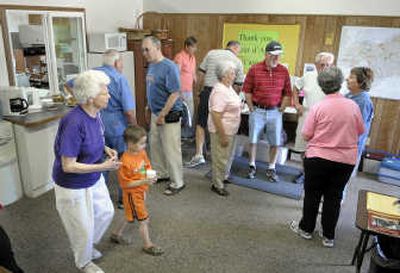Costs squeeze Meals on Wheels

People working in the region’s meal-delivery programs are seeing an inflationary double-whammy – on the meals and on the wheels.
Regional Meals on Wheels programs, which deliver food to the elderly and homebound, are seeing their food costs rise sharply – as is everyone, with grocery bills rising faster than at any time in the last two decades. And the run-up to $4 gas has driven down the number of volunteers willing to deliver the meals.
“It’s hitting us twofold,” said Pam Almeida, executive director of the Spokane Valley Meals on Wheels program.
Prices have been rising for months, and some of the ripple effects are just starting to show up. Almeida said her program’s bill for liquid nutrition – supplements such as Boost and Ensure that are critical to some clients – went up by 50 percent recently, from $16 a case to $24.
“I don’t know what we’re going to do about that,” she said. “I’m very afraid that everything’s going to follow suit.”
No one has missed meals as a result of the pinch, but the programs find themselves scrounging around to make their dollars stretch and to make sure they have enough drivers. Meals on Wheels officials said they’re working harder to find deals, offering drivers mileage reimbursements, and seeking donations to help cover expenses. The programs get funding from a variety of sources, including federal and state funds, client fees and donations.
“We’ve been getting some very generous donations to help us with the cost of meals,” said Marie Fish, executive director of the Post Falls Senior Center. “Last year we had a dinner-dance every month. We just had to, to meet our expenses.”
Nationwide, the price increases have made it hard for some Meals on Wheels programs to attract drivers. According to the national organization, 58 percent of programs surveyed in May said they’d lost drivers because of gas prices, and some had eliminated meals or customers.
Tricia Dormaier, director of volunteers for Spokane’s program, said she hasn’t lost drivers or had any cut back on their days. But she said she’s been particularly attentive to keeping the routes efficient and trying not to overbook drivers, given the high gas prices.
The Spokane program delivers 350 meals a day, with more than 50 regular drivers handling 22 routes.
Meals on Wheels and senior center officials say they’re seeing more demand, as well. Seniors are having a hard time affording food, and food banks are struggling to keep up with the need themselves.
The Post Falls center recently raised its suggested donation for meals from $3 to $3.50. At the Lake City Senior Center in Coeur d’Alene, the suggested donation has risen to $4.
Even given the high costs, though, most program officials say they’ve seen a corresponding surge in donations and other kinds of help. Cash contributions have eased the burden at the Post Falls center, Fish said.
And LeAnn Carney, who coordinates the meals program at the Lake City center, said that when she started seeing the number of drivers dwindle in recent months, she put out an ad.
“People just came out of the woodwork to help us,” she said.